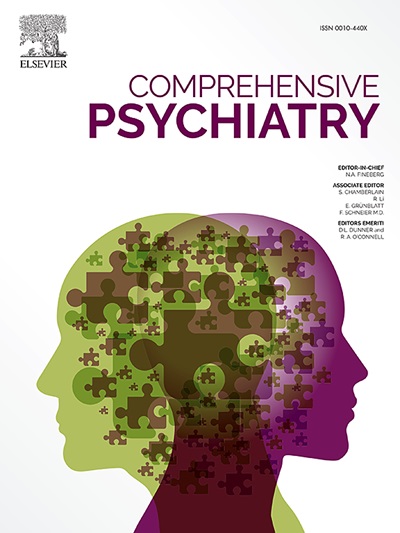情绪弹性技能训练后公安人员心理健康障碍症状的变化
IF 4.2
2区 医学
Q1 PSYCHIATRY
引用次数: 0
摘要
目的公共安全人员(PSP)经常暴露于心理创伤事件中。暴露可诱发创伤后应激性损伤,包括创伤后应激障碍(PTSD)。加拿大皇家骑警(RCMP)协议旨在通过持续监测和psp提供的基于情绪障碍跨诊断治疗统一协议的情绪恢复技能培训(ERST)来减轻创伤后应激障碍。目前的研究在不同的PSP中试点测试了ERST的有效性。方法采用为期16个月的纵向设计(n = 119;女性占34%;消防员,市政警察,护理人员,公共安全传播者)完成psp交付的ERST。在训练前和训练后评估参与者的PTSD症状,包括但不限于PTSD,并使用自我报告测量和临床访谈进行1年的随访。结果与训练前相比,PTSD和其他创伤后应激障碍的自我报告和临床诊断访谈阳性筛查(ps <;0.05), 1年随访时心理健康状况持续或改善。在消防员(Cohen's d = 0.40至0.71)、警察(Cohen's d = 0.28至0.38)、护理人员(Cohen's d = 0.20至0.56)和通讯员(Cohen's d = 0.05至0.14)中观察到改善。结论持续监测和PSP提供的ERST可以在不同PSP群体中产生或大或小的心理健康改善,或减轻PSP心理健康挑战,其差异受训练前因素和组织支持的影响。ERST的复制和推广研究似乎是有必要的。注册:aspredicted.org, #90136。已注册2022年3月7日-预期已注册。试验注册:ClinicalTrials.gov, NCT05530642。本文章由计算机程序翻译,如有差异,请以英文原文为准。
Mental health disorder symptom changes among public safety personnel after emotional resilience skills training
Objectives
Public safety personnel (PSP) are frequently exposed to psychologically traumatic events. The exposures potentiate posttraumatic stress injuries (PTSIs), including posttraumatic stress disorder (PTSD). The Royal Canadian Mounted Police (RCMP) Protocol was designed to mitigate PTSIs using ongoing monitoring and PSP-delivered Emotional Resilience Skills Training (ERST) based on the Unified Protocol for the Transdiagnostic Treatment of Emotional Disorders. The current study pilot-tested ERST effectiveness among diverse PSP.
Methods
A 16-month longitudinal design engaged serving PSP (n = 119; 34 % female; firefighters, municipal police, paramedics, public safety communicators) who completed PSP-delivered ERST. Participants were assessed for symptoms of PTSIs, including but not limited to PTSD, at pre- and post-training, and 1-year follow-up using self-report measures and clinical interviews.
Results
There were reductions in self-report and clinical diagnostic interview positive screens for PTSD and other PTSI from pre- to post-training (ps < 0.05), with mental health sustained or improved at 1-year follow-up. Improvements were observed among firefighters (Cohen's d = 0.40 to 0.71), police (Cohen's d = 0.28 to 0.38), paramedics (Cohen's d = 0.20 to 0.56), and communicators (Cohen's d = 0.05 to 0.14).
Conclusion
Ongoing monitoring and PSP-delivered ERST, can produce small to large mental health improvements among diverse PSP, or mitigate PSP mental health challenges, with variations influenced by pre-training factors and organizational supports. ERST replication and extension research appears warranted.
Trial registration
Hypotheses Registration: aspredicted.org, #90136. Registered 7 March 2022 - Prospectively registered. Trial registration: ClinicalTrials.gov, NCT05530642.
求助全文
通过发布文献求助,成功后即可免费获取论文全文。
去求助
来源期刊

Comprehensive psychiatry
医学-精神病学
CiteScore
12.50
自引率
1.40%
发文量
64
审稿时长
29 days
期刊介绍:
"Comprehensive Psychiatry" is an open access, peer-reviewed journal dedicated to the field of psychiatry and mental health. Its primary mission is to share the latest advancements in knowledge to enhance patient care and deepen the understanding of mental illnesses. The journal is supported by a diverse team of international editors and peer reviewers, ensuring the publication of high-quality research with a strong focus on clinical relevance and the implications for psychopathology.
"Comprehensive Psychiatry" encourages authors to present their research in an accessible manner, facilitating engagement with clinicians, policymakers, and the broader public. By embracing an open access policy, the journal aims to maximize the global impact of its content, making it readily available to a wide audience and fostering scientific collaboration and public awareness beyond the traditional academic community. This approach is designed to promote a more inclusive and informed dialogue on mental health, contributing to the overall progress in the field.
 求助内容:
求助内容: 应助结果提醒方式:
应助结果提醒方式:


